【推荐】老外交官谈英语演讲之道(word格式) (2页)
老外交官谈英语演讲之道
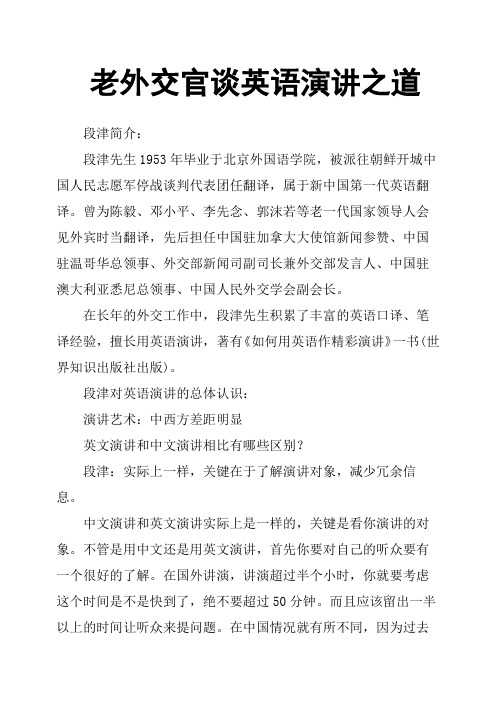
老外交官谈英语演讲之道段津简介:段津先生1953年毕业于北京外国语学院,被派往朝鲜开城中国人民志愿军停战谈判代表团任翻译,属于新中国第一代英语翻译。
曾为陈毅、邓小平、李先念、郭沫若等老一代国家领导人会见外宾时当翻译,先后担任中国驻加拿大大使馆新闻参赞、中国驻温哥华总领事、外交部新闻司副司长兼外交部发言人、中国驻澳大利亚悉尼总领事、中国人民外交学会副会长。
在长年的外交工作中,段津先生积累了丰富的英语口译、笔译经验,擅长用英语演讲,著有《如何用英语作精彩演讲》一书(世界知识出版社出版)。
段津对英语演讲的总体认识:演讲艺术:中西方差距明显英文演讲和中文演讲相比有哪些区别?段津:实际上一样,关键在于了解演讲对象,减少冗余信息。
中文演讲和英文演讲实际上是一样的,关键是看你演讲的对象。
不管是用中文还是用英文演讲,首先你要对自己的听众要有一个很好的了解。
在国外讲演,讲演超过半个小时,你就要考虑这个时间是不是快到了,绝不要超过50分钟。
而且应该留出一半以上的时间让听众来提问题。
在中国情况就有所不同,因为过去的习惯,有的时候往往邀请方要求我讲三个小时。
实际上现在中国人也愿意听短话,特别是没有什么信息量的套话说法,我们的演讲如何运用语言魅力打动听众?适应听众思维习惯?段津:在讲演当中,语言文字的运用很重要。
第一,语言表达纯熟清晰。
第二,以对方习惯的方式、喜欢的方式来讲。
第三,要有内容。
当听众通过赞扬英文的办法来赞扬你时,例如观众对你说Articulate,这是表示你讲得非常清晰,你听到这样的评语之后,实际上就说明你的内容已经打动了人。
根据我的经验,适应听众思维习惯,在讲演一定要注意观众的反映。
我的讲话就是半个小时,必要的时候缩短20分钟。
我看大家睁着眼睛很安安静静的在听,我就多讲几句。
讲话不要长,讲20分钟就可以打住了,然后让人家提问题,这个10分钟是有效的10分钟,你可以根据他们提的问题,不完全是切中这个问题放大放开讲。
外交部培训发言稿英文(3篇)
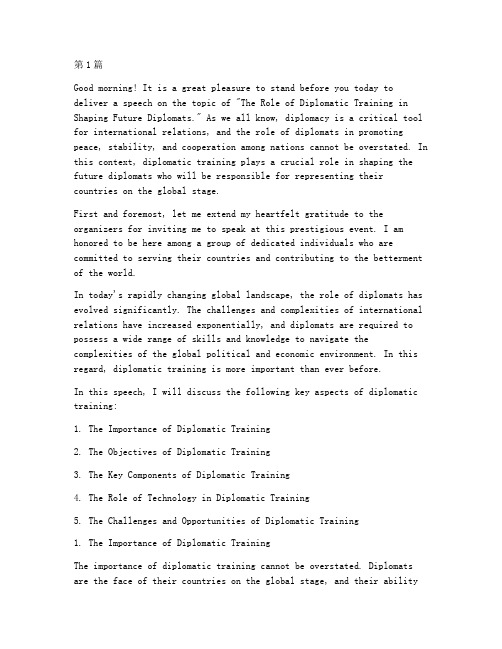
第1篇Good morning! It is a great pleasure to stand before you today todeliver a speech on the topic of "The Role of Diplomatic Training in Shaping Future Diplomats." As we all know, diplomacy is a critical tool for international relations, and the role of diplomats in promoting peace, stability, and cooperation among nations cannot be overstated. In this context, diplomatic training plays a crucial role in shaping the future diplomats who will be responsible for representing their countries on the global stage.First and foremost, let me extend my heartfelt gratitude to the organizers for inviting me to speak at this prestigious event. I am honored to be here among a group of dedicated individuals who are committed to serving their countries and contributing to the betterment of the world.In today's rapidly changing global landscape, the role of diplomats has evolved significantly. The challenges and complexities of international relations have increased exponentially, and diplomats are required to possess a wide range of skills and knowledge to navigate the complexities of the global political and economic environment. In this regard, diplomatic training is more important than ever before.In this speech, I will discuss the following key aspects of diplomatic training:1. The Importance of Diplomatic Training2. The Objectives of Diplomatic Training3. The Key Components of Diplomatic Training4. The Role of Technology in Diplomatic Training5. The Challenges and Opportunities of Diplomatic Training1. The Importance of Diplomatic TrainingThe importance of diplomatic training cannot be overstated. Diplomats are the face of their countries on the global stage, and their abilityto effectively represent their nations depends on their knowledge, skills, and values. Here are some reasons why diplomatic training is essential:a. Building a Strong Foundation: Diplomatic training provides future diplomats with a strong foundation in international relations, history, law, and other relevant disciplines. This knowledge is essential for understanding the complexities of the global political and economic environment.b. Developing Key Skills: Diplomatic training equips diplomats with a wide range of skills, including communication, negotiation, conflict resolution, and crisis management. These skills are crucial for success in the field of diplomacy.c. Fostering Cultural Awareness: Diplomats must be able to interact with people from different cultures and backgrounds. Diplomatic training helps diplomats develop cultural awareness and sensitivity, which is essential for building effective relationships with counterparts from other countries.d. Promoting Ethical Standards: Diplomatic training emphasizes the importance of ethical standards and integrity. This is crucial for maintaining the trust and respect of other nations and stakeholders.2. The Objectives of Diplomatic TrainingThe objectives of diplomatic training are multifaceted, and they include:a. Providing a comprehensive understanding of international relations, history, and law.b. Developing communication, negotiation, conflict resolution, andcrisis management skills.c. Fostering cultural awareness and sensitivity.d. Promoting ethical standards and integrity.e. Equipping diplomats with the knowledge and skills necessary to represent their countries effectively on the global stage.3. The Key Components of Diplomatic TrainingDiplomatic training encompasses various components, which are designed to equip future diplomats with the necessary knowledge and skills. Some of the key components include:a. Academic Courses: These courses cover a wide range of topics, including international relations, history, law, economics, andpolitical science. They provide a strong foundation for understanding the complexities of the global political and economic environment.b. Practical Training: Practical training involves simulations, role-playing exercises, and internships in diplomatic missions. This hands-on experience helps diplomats develop their skills and gain a deeper understanding of the challenges they will face in their careers.c. Soft Skills Development: Diplomatic training also focuses on developing soft skills, such as communication, negotiation, and leadership. These skills are essential for building effective relationships with counterparts from other countries.d. Cultural Training: Cultural training helps diplomats understand the customs, traditions, and values of different cultures. This knowledge is crucial for building strong relationships with counterparts from other countries and avoiding cultural misunderstandings.4. The Role of Technology in Diplomatic TrainingTechnology has revolutionized the way diplomatic training is conducted. Here are some ways in which technology has impacted diplomatic training:a. Online Courses: Online courses provide flexibility and accessibility to a wider audience. They allow diplomats to learn at their own pace and from anywhere in the world.b. Virtual Reality (VR) Simulations: VR simulations enable diplomats to experience realistic scenarios and practice their skills in a controlled environment. This technology can help them develop critical thinking and decision-making abilities.c. Data Analytics: Data analytics can be used to track the progress of diplomats and identify areas for improvement. This data-driven approach can help tailor training programs to meet the specific needs of individual diplomats.5. The Challenges and Opportunities of Diplomatic TrainingDiplomatic training faces several challenges and opportunities, which include:a. Challenges:i. Keeping Pace with Global Changes: The rapidly changing global landscape poses a challenge for diplomatic training programs. They must continuously update their curricula to keep pace with new developments in international relations.ii. Resource Allocation: Diplomatic training requires significant resources, including funding, personnel, and infrastructure. Allocating these resources effectively can be a challenge.iii. Cultural Differences: Cultural differences can pose challenges for diplomatic training programs, as they must cater to the diverse needs of diplomats from various countries.b. Opportunities:i. Technology: The use of technology in diplomatic training presents opportunities to improve the quality and accessibility of training programs.ii. Collaboration: Collaboration between governments, educational institutions, and private sector organizations can enhance the effectiveness of diplomatic training.iii. Focus on Soft Skills: The increasing emphasis on soft skills development provides opportunities for diplomats to excel in their careers.In conclusion, diplomatic training is an essential component of preparing future diplomats for the challenges and opportunities of theglobal stage. As we navigate the complexities of the 21st century, it is crucial that we invest in the training and development of our diplomats. By equipping them with the necessary knowledge, skills, and values, we can ensure that they will be able to represent their countrieseffectively and contribute to the betterment of the world.Thank you for your attention, and I am now open to any questions you may have.第2篇Good morning! It is my great honor to stand here today to deliver a speech on the theme of "The Role of Diplomats in the Era of Globalization". As we all know, diplomacy is an essential tool for the promotion of peace, stability, and development in the world. In the era of globalization, the role of diplomats has become even more significant. Therefore, it is crucial for us to understand the challenges and opportunities that diplomats face, and to enhance our capabilities inthis field.First of all, let us explore the definition of diplomacy. Diplomacyrefers to the conduct of international relations through theintercession of representatives with each other or with international organizations. As diplomats, our primary mission is to promote the interests of our countries while maintaining friendly and cooperative relations with other nations. This requires us to possess a comprehensive set of skills and qualities.1. Communication SkillsEffective communication is the cornerstone of diplomacy. As diplomats, we must be able to convey our messages clearly and concisely, both in written and spoken forms. We should also be able to listen actively and empathetically, to understand the perspectives and needs of others. This is especially important when dealing with complex international issues, where misunderstandings can lead to conflict.2. Negotiation SkillsNegotiation is an essential skill for diplomats. We must be adept at finding common ground and resolving disputes through dialogue. This requires us to be patient, persistent, and willing to compromise. In the era of globalization, the ability to negotiate effectively is morecrucial than ever, as countries increasingly rely on each other for economic, political, and security interests.3. Cultural AwarenessAs diplomats, we represent our countries in diverse cultural settings.It is essential for us to be culturally sensitive and aware of the customs, traditions, and values of other nations. This allows us tobuild strong relationships with our counterparts and to navigate the complexities of international relations more effectively.4. Analytical SkillsDiplomats must possess strong analytical skills to understand the political, economic, and social dynamics of the countries they represent. This includes the ability to analyze trends, predict future developments, and formulate effective strategies. In the era of globalization, where information is readily available, it is crucial for us to be discerning and critical thinkers.5. Ethical StandardsAs representatives of our countries, diplomats must uphold the highest ethical standards. We must be honest, transparent, and committed to the principles of international law and human rights. This not only reflects well on our personal integrity but also enhances the credibility and reputation of our nations.Now that we have a better understanding of the skills and qualities required of diplomats, let us delve into the challenges andopportunities that we face in the era of globalization.1. Challengesa. The Rise of PopulismOne of the most significant challenges in the era of globalization is the rise of populism. Populist movements often emphasize national sovereignty and reject the idea of international cooperation. As diplomats, we must navigate this challenging landscape, promoting the benefits of globalization while addressing the concerns of our citizens.b. Technological AdvancementsThe rapid pace of technological advancements has brought both opportunities and challenges. On one hand, it has made communication and information sharing more accessible. On the other hand, it has also led to the spread of misinformation and fake news, which can undermine trust and stability in international relations.c. Climate ChangeClimate change is a global issue that requires international cooperation to address. As diplomats, we must work together to develop and implement effective policies to mitigate the impact of climate change. This requires us to navigate complex negotiations and build coalitions among nations with diverse interests.2. Opportunitiesa. Economic IntegrationGlobalization has led to increased economic integration, creating opportunities for trade, investment, and development. As diplomats, we can leverage these opportunities to promote the economic growth and prosperity of our nations.b. People-to-People ExchangesThe era of globalization has facilitated people-to-people exchanges, allowing us to build stronger relationships and mutual understanding among nations. As diplomats, we can organize cultural, educational, and sports exchanges to promote friendship and cooperation.c. MultilateralismMultilateralism remains the most effective framework for addressing global challenges. As diplomats, we must work together to strengthen international institutions and promote multilateralism in all aspects of international relations.In conclusion, the role of diplomats in the era of globalization is both challenging and rewarding. We must continuously enhance our skills and qualities to navigate the complexities of international relations and promote the interests of our nations. By embracing the opportunities and addressing the challenges, we can contribute to a more peaceful, stable, and prosperous world.Thank you for your attention. I look forward to engaging in a lively discussion with you on this important topic.第3篇Good morning! It is a great honor to stand here today and address youall at this Foreign Ministry Training Session. As a seasoned diplomat, I have witnessed the remarkable growth and development of our nation’s foreign policy over the years. Today, I would like to share with you some insights and experiences that I have gained throughout my diplomatic career, with the hope of contributing to your own growth and success as future diplomats.First and foremost, let us reflect on the significance of diplomacy in our nation’s foreign policy. Diplomacy is the art of conducti ng negotiations, maintaining relations, and promoting peace and cooperation among countries. It plays a crucial role in shaping our country’s image and interests on the global stage. As future diplomats, it is our responsibility to uphold the principles of diplomacy and contribute to the building of a peaceful and stable international community.1. Understanding the Essence of DiplomacyDiplomacy is not merely about formal meetings, handshakes, and signatures of agreements. It is about understanding the essence of human relationships, the dynamics of international politics, and the complexities of global issues. To excel in diplomacy, we must:a. Cultivate empathy and sensitivity: Understand the perspectives, cultures, and values of different nations and peoples. This will enable us to build strong relationships and foster mutual trust.b. Develop critical thinking: Analyze complex situations and propose creative solutions. As diplomats, we must be able to anticipate and respond to the ever-changing international landscape.c. Master language skills: Proficiency in at least one foreign language is essential for effective communication and building relationships with foreign counterparts.2. Embracing the Challenges of Diplomatic WorkDiplomatic work is often challenging and demanding. Here are some key challenges we may encounter and ways to overcome them:a. Language barriers: Learn and practice foreign languages to improve communication skills and bridge cultural gaps.b. Cultural differences: Be open-minded and willing to adapt to new cultures. This will help us build strong relationships and promote mutual understanding.c. Stress management: Develop effective stress management techniques to maintain mental and physical well-being during challenging times.3. The Role of Technology in DiplomacyIn today’s digital age, technology plays an increasingly significant role in diplomacy. Here are some ways in which technology can be leveraged:a. Social media: Utilize social media platforms to engage with foreign audiences, share information, and promote mutual understanding.b. Data analysis: Employ data analysis tools to track international trends, identify potential threats, and inform policy decisions.c. E-diplomacy: Implement e-diplomatic initiatives to streamline communication and enhance collaboration among diplomatic missions.4. The Importance of Ethics in DiplomacyEthics is the backbone of diplomacy. As future diplomats, we must adhere to the following ethical principles:a. Integrity: Maintain honesty and transparency in all our actions and decisions.b. Objectivity: Remain neutral and unbiased in our assessments and recommendations.c. Respect: Show respect for the values, beliefs, and cultures of others.5. The Role of Diplomats in Promoting Global Peace and SecurityDiplomats play a crucial role in promoting global peace and security. Here are some ways in which we can contribute:a. Conflict prevention and resolution: Work towards resolving conflicts through peaceful means, such as mediation and negotiation.b. Arms control and disarmament: Participate in international efforts to prevent the proliferation of weapons of mass destruction.c. Human rights: Advocate for the protection and promotion of human rights worldwide.6. ConclusionIn conclusion, diplomacy is a noble profession that requires dedication, hard work, and a commitment to the betterment of humanity. As future diplomats, we must be prepared to face the challenges and opportunities that lie ahead. By embracing the essence of diplomacy, mastering the art of negotiation, and adhering to ethical principles, we can contribute to the building of a more peaceful, stable, and prosperous world.I wish you all the best in your diplomatic careers and hope that youwill find the insights and experiences shared today helpful in your future endeavors. Thank you.。
尼克松访华演讲英文版
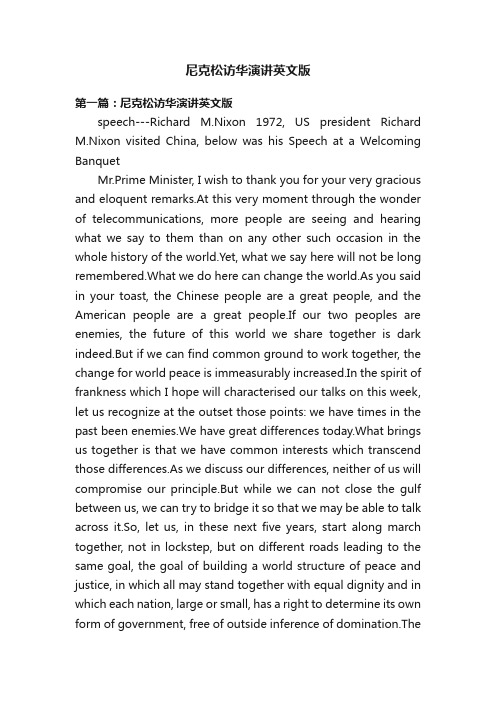
尼克松访华演讲英文版第一篇:尼克松访华演讲英文版speech---Richard M.Nixon 1972, US president Richard M.Nixon visited China, below was his Speech at a Welcoming BanquetMr.Prime Minister, I wish to thank you for your very gracious and eloquent remarks.At this very moment through the wonder of telecommunications, more people are seeing and hearing what we say to them than on any other such occasion in the whole history of the world.Yet, what we say here will not be long remembered.What we do here can change the world.As you said in your toast, the Chinese people are a great people, and the American people are a great people.If our two peoples are enemies, the future of this world we share together is dark indeed.But if we can find common ground to work together, the change for world peace is immeasurably increased.In the spirit of frankness which I hope will characterised our talks on this week, let us recognize at the outset those points: we have times in the past been enemies.We have great differences today.What brings us together is that we have common interests which transcend those differences.As we discuss our differences, neither of us will compromise our principle.But while we can not close the gulf between us, we can try to bridge it so that we may be able to talk across it.So, let us, in these next five years, start along march together, not in lockstep, but on different roads leading to the same goal, the goal of building a world structure of peace and justice, in which all may stand together with equal dignity and in which each nation, large or small, has a right to determine its own form of government, free of outside inference of domination.Theworld watches.The world listens.The world waits to see what we’ll do.What is the world? In a personal sense, I think of my eldest daughter whose birthday is today.As I think of her, I think of all the children in the world, in Asia, in Africa, in Europe, in the Americas, most of whom were born since the date of the foundation of the People’s Repulic of China.What legacy shall we leave our children? Are they destined to die for the hatreds which have plagued the old world, or are they destined to live because we had the vision to build a new world?There is no reason for us to be enemies.Neither of us seeks the territory of the other, neither of us seeks domination over the other, and neither of us seeks to stretch out our hands and rule the world.Chairman Mao has written, “So many deeds cry out to be done, and always urgently;the world rolls on, time presses.Ten thousand years are too long, seize the hour!” This is the hour.This is the day for our two peoples to rise to the heights of greatness which can build a new and a better world.In that spirit, I ask all of you present to join me in raising your glasses to Chairman Mao, to Prime Minister Zhou, and to the friendship of the Chinese and American people that can lead to friendship and peace for all people in the world.总理先生,我要感谢您好作的如此盛情和意味深长的讲话。
布什清华演讲 中英对照

美国总统布什在北京清华大学与学生对话的中英全文清华学生用英文提问:昨天您和江主席进行了谈话,并且开了联合发布会,您在这个会上没有清楚地回答一个问题,那就是战区导弹防御系统是否会包含台湾在内?另外,我还想问,谈到台湾问题的时候,您说和平解决,您对和平统一是怎样的看法?布什:非常好的问题,首先,我很赞赏你的英文,非常好!讲到台湾问题,很重要的一点就是美国的政府在讲到如何和平解决台湾问题的时候,总是说到和平、对话,我们强调和平这个字,我们指的是双方都要以和平的方式来解决,任何一方都不可以进行任何挑衅的行为。
我跟中国的领导人有过多次的谈话,每一次我们都强调我是支持“一个中国”的政策,而且这是长期一贯的政策,到目前为止没有改变。
至于有关导弹防御系统,我已经说得非常清楚,这是一个防御性的系统,是要帮助我们的盟友和其他一些国家来保护他们免受无赖国家的攻击,这些国家是希望发展大规模杀伤性武器的,我想制定这一点,对和平是非常有重要的,我昨天也非常清楚地说明这是事实。
我们目前正在发展导弹防御系统的过程中,目前还不知道可行不可行,但是我觉得对全世界的和平会带来贡献。
还有一点,我觉得对中国人来说,对美国人来说这一点必须要知道,美国政府希望能够以和平的方式解决发生在全世界的许多问题,那因为美国现在处理的问题非常多,好象中东的问题,你们从新闻上看到以后知道了,这是一个非常危险的时代,我们正在努力地致力于和平,我们希望克什米尔的问题也能够和平解决,这对中国也非常重要的。
我来中国以前,我到了韩国,我也明确表示,我希望以和平的方式解决朝鲜半岛的问题。
清华大学传播系学生:很遗憾,您刚才还是没有明确的回答,您总是说和平解决,而没有说和平统一。
三天前您在日本访问时,在议会发表演讲说,美国将牢记对台湾的承诺,我想问总统先生这样一个问题,美国是否还牢记他对十三亿中国人民的承诺呢?那就是遵守《中美三个联合公报》和“三不”政策。
布什:感谢您,我想台湾问题是全世界都关心的问题。
揭秘英语演讲中有哪些技巧与注意事项.doc
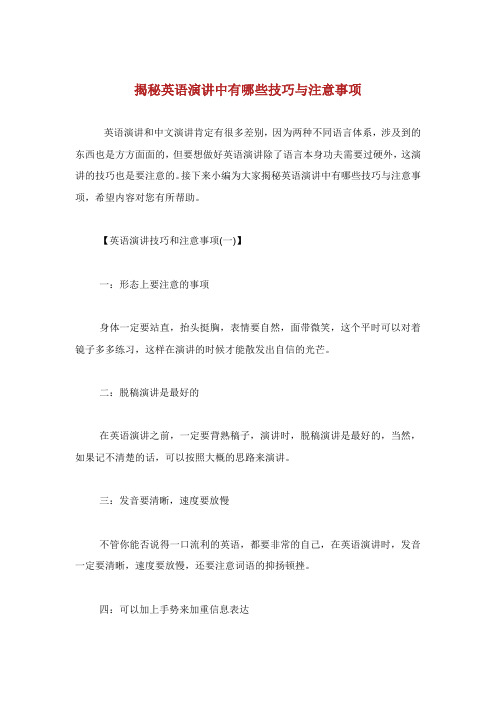
揭秘英语演讲中有哪些技巧与注意事项英语演讲和中文演讲肯定有很多差别,因为两种不同语言体系,涉及到的东西也是方方面面的,但要想做好英语演讲除了语言本身功夫需要过硬外,这演讲的技巧也是要注意的。
接下来小编为大家揭秘英语演讲中有哪些技巧与注意事项,希望内容对您有所帮助。
【英语演讲技巧和注意事项(一)】一:形态上要注意的事项身体一定要站直,抬头挺胸,表情要自然,面带微笑,这个平时可以对着镜子多多练习,这样在演讲的时候才能散发出自信的光芒。
二:脱稿演讲是最好的在英语演讲之前,一定要背熟稿子,演讲时,脱稿演讲是最好的,当然,如果记不清楚的话,可以按照大概的思路来演讲。
三:发音要清晰,速度要放慢不管你能否说得一口流利的英语,都要非常的自己,在英语演讲时,发音一定要清晰,速度要放慢,还要注意词语的抑扬顿挫。
四:可以加上手势来加重信息表达很多演讲者演讲时,都很善于运用手势,这可以加重信息的表达,可以用食指、手掌示意,加重语气,当然,表情要需要注意哦!好啦~以上就是英语演讲的技巧,想要获得成功的演讲,以上几点对你有所帮助哦!还有在演讲时,一定要注意麦克风礼仪。
【英语演讲技巧和注意事项(二)】非常有幸成为21世纪杯全国中小学生英语演讲比赛成都赛区的一名评委,这里我大概谈谈海选和复赛阶段的英语演讲比赛应该怎么准备吧(很多孩纸应该是走到海选这一环节就被毙了)。
记得当年以大学一年级新生身份参加四川大学英语演讲比赛并夺得全校第一,那时漫长的准备过程和激烈的比赛场景还是历历在目的。
首先,你得有一篇自己写的演讲稿。
我非常鼓励孩子们自己执笔写自己的事儿,哪怕你语法或写作比较挫,可以尝试先写成中文,再逐句翻译,最后请牛人帮你改改。
总之,一定要自己动手写,这将是一次训练写作、锻炼逻辑、展现情商、考验友谊等全方位的难得机会,退一万步说自己写的东西记得最牢嘛。
记得牢的好处是会减少你上台之后被视jian的紧张感,紧张感减少会让你更自信,有了自信那么演讲就能发挥得游刃有余,当然一系列日怪小动作比如抖脚、抠手、挖鼻孔也就随之消失了。
外交官全英文演讲稿范文
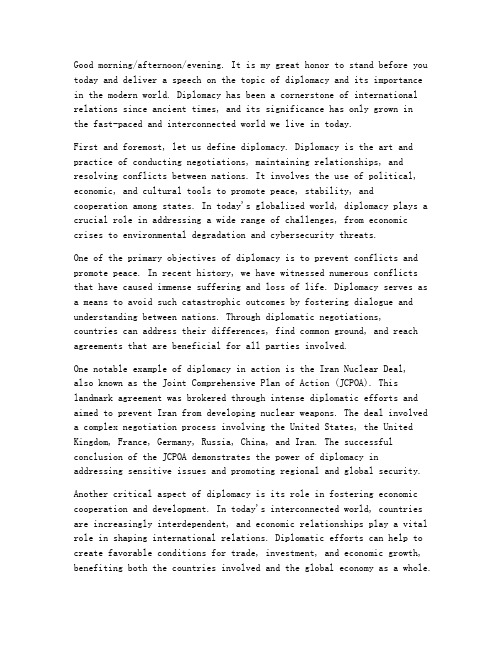
Good morning/afternoon/evening. It is my great honor to stand before you today and deliver a speech on the topic of diplomacy and its importance in the modern world. Diplomacy has been a cornerstone of international relations since ancient times, and its significance has only grown in the fast-paced and interconnected world we live in today.First and foremost, let us define diplomacy. Diplomacy is the art and practice of conducting negotiations, maintaining relationships, and resolving conflicts between nations. It involves the use of political, economic, and cultural tools to promote peace, stability, and cooperation among states. In today's globalized world, diplomacy plays a crucial role in addressing a wide range of challenges, from economic crises to environmental degradation and cybersecurity threats.One of the primary objectives of diplomacy is to prevent conflicts and promote peace. In recent history, we have witnessed numerous conflicts that have caused immense suffering and loss of life. Diplomacy serves as a means to avoid such catastrophic outcomes by fostering dialogue and understanding between nations. Through diplomatic negotiations, countries can address their differences, find common ground, and reach agreements that are beneficial for all parties involved.One notable example of diplomacy in action is the Iran Nuclear Deal, also known as the Joint Comprehensive Plan of Action (JCPOA). This landmark agreement was brokered through intense diplomatic efforts and aimed to prevent Iran from developing nuclear weapons. The deal involved a complex negotiation process involving the United States, the United Kingdom, France, Germany, Russia, China, and Iran. The successful conclusion of the JCPOA demonstrates the power of diplomacy in addressing sensitive issues and promoting regional and global security.Another critical aspect of diplomacy is its role in fostering economic cooperation and development. In today's interconnected world, countries are increasingly interdependent, and economic relationships play a vital role in shaping international relations. Diplomatic efforts can help to create favorable conditions for trade, investment, and economic growth, benefiting both the countries involved and the global economy as a whole.For instance, the World Trade Organization (WTO) is an international organization that aims to promote free trade and reduce trade barriers among its member states. Through diplomatic negotiations and dispute resolution mechanisms, the WTO helps to ensure a level playing field for businesses and fosters economic stability and growth. Additionally, diplomatic initiatives such as the Paris Agreement on climate change demonstrate the potential of diplomacy to address global challenges and achieve collective goals.Furthermore, diplomacy plays a crucial role in promoting cultural exchange and understanding. Cultural diplomacy involves the use of arts, sports, education, and tourism to foster positive relations between nations. Through cultural exchange programs, people from different countries can learn about each other's traditions, values, and perspectives, which can help to build mutual respect and cooperation.One example of cultural diplomacy is the Confucius Institutes, which are non-profit educational institutions established to promote Chinese language and culture. These institutes have been instrumental in fostering people-to-people exchanges and enhancing mutual understanding between China and other countries.In conclusion, diplomacy is an essential tool for addressing the challenges of the modern world. It serves as a means to prevent conflicts, promote peace, foster economic cooperation, and facilitate cultural exchange. As we navigate an increasingly complex and interconnected world, the importance of diplomacy cannot be overstated.However, diplomacy is not without its challenges. The world is characterized by diverse interests, ideologies, and power dynamics, which can make negotiations and agreements difficult to achieve. In order to be effective, diplomacy requires patience, perseverance, and a willingness to compromise.As diplomats, we must always remain committed to the principles of diplomacy, including respect for sovereignty, non-interference in internal affairs, and the pursuit of mutual benefits. We must also beadaptable and innovative, as the nature of international relations is constantly evolving.In conclusion, diplomacy is a powerful instrument for building a more peaceful, stable, and prosperous world. By working together, we can overcome the challenges that lie ahead and create a future that is brighter for all. Thank you.。
外交部培训发言稿英文版(3篇)
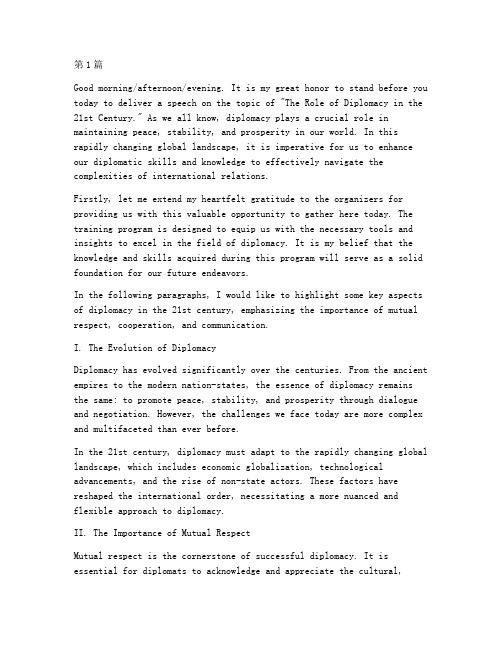
第1篇Good morning/afternoon/evening. It is my great honor to stand before you today to deliver a speech on the topic of "The Role of Diplomacy in the 21st Century." As we all know, diplomacy plays a crucial role in maintaining peace, stability, and prosperity in our world. In this rapidly changing global landscape, it is imperative for us to enhance our diplomatic skills and knowledge to effectively navigate the complexities of international relations.Firstly, let me extend my heartfelt gratitude to the organizers for providing us with this valuable opportunity to gather here today. The training program is designed to equip us with the necessary tools and insights to excel in the field of diplomacy. It is my belief that the knowledge and skills acquired during this program will serve as a solid foundation for our future endeavors.In the following paragraphs, I would like to highlight some key aspects of diplomacy in the 21st century, emphasizing the importance of mutual respect, cooperation, and communication.I. The Evolution of DiplomacyDiplomacy has evolved significantly over the centuries. From the ancient empires to the modern nation-states, the essence of diplomacy remains the same: to promote peace, stability, and prosperity through dialogue and negotiation. However, the challenges we face today are more complex and multifaceted than ever before.In the 21st century, diplomacy must adapt to the rapidly changing global landscape, which includes economic globalization, technological advancements, and the rise of non-state actors. These factors have reshaped the international order, necessitating a more nuanced and flexible approach to diplomacy.II. The Importance of Mutual RespectMutual respect is the cornerstone of successful diplomacy. It is essential for diplomats to acknowledge and appreciate the cultural,social, and political differences that exist among nations. By doing so, we can foster a spirit of cooperation and build strong, lasting relationships.In the 21st century, mutual respect also entails recognizing the rights and sovereignty of other nations. It is our duty to promote a world where nations coexist in harmony, respecting each other's choices and priorities. This respect should extend beyond the formal diplomatic channels and permeate all aspects of our interactions with other countries.III. The Power of CooperationCooperation is a vital tool for diplomats to address global challenges. The world today faces numerous pressing issues, such as climate change, poverty, and terrorism, which require collective action and cooperation among nations.Diplomats must strive to build partnerships and alliances based on mutual interests and shared values. By working together, we can achieve more significant progress in addressing these challenges and creating a better future for all.IV. Effective CommunicationCommunication is the lifeblood of diplomacy. Diplomats must possess excellent communication skills to convey their ideas, negotiate effectively, and build trust with counterparts from different backgrounds.In the 21st century, diplomacy must also adapt to the digital age. Social media, email, and other digital platforms have become essential tools for diplomats to engage with their counterparts and the public. It is crucial for us to master these tools and use them to promote our national interests and foster global understanding.V. The Role of Diplomacy in Promoting Peace and StabilityDiplomacy plays a critical role in preventing conflicts and promoting peace and stability. Diplomats must be adept at identifying potentialconflicts, engaging in conflict prevention efforts, and mediating disputes.In the 21st century, diplomacy must also address the root causes of conflicts, such as poverty, inequality, and discrimination. By addressing these underlying issues, we can contribute to a more peaceful and stable world.VI. The Importance of Professionalism and IntegrityProfessionalism and integrity are indispensable qualities for diplomats. As representatives of their nations, diplomats must uphold the highest standards of conduct, both in their personal and professional lives.In the 21st century, diplomats must also be aware of the ethical challenges they may face. It is our responsibility to act with integrity, honesty, and transparency in all our dealings.In conclusion, diplomacy plays a vital role in shaping the future of our world. As diplomats, we must be equipped with the necessary skills, knowledge, and attitudes to navigate the complexities of international relations and contribute to a more peaceful, stable, and prosperous world.I would like to take this opportunity to encourage all of you toactively participate in the training program, absorb the knowledge and insights shared by our esteemed speakers, and apply them in your future diplomatic endeavors.Let us work together to promote mutual respect, cooperation, and communication, and build a more harmonious and interconnected world.Thank you for your attention, and I wish you a successful training program.Best regards,[Your Name][Your Position][Your Organization]第2篇Good morning/afternoon. It is a great pleasure to stand before you today at the Diplomatic Training Program. I am honored to have the opportunity to address this esteemed group of future diplomats and foreign service professionals. As we embark on this journey together, I would like to share some insights and reflections on the role of diplomacy in today's global landscape and the essential qualities that a diplomat must possess.The Evolution of DiplomacyDiplomacy, as we know it, has evolved significantly over the centuries. From the early days of its origins in ancient civilizations, diplomacy has been a tool used by states to secure peace, negotiate treaties, and protect their interests. In the modern era, diplomacy has become even more complex, encompassing a wide array of issues ranging from economic cooperation to environmental protection and cybersecurity.In the face of a rapidly changing world, diplomacy has had to adapt to new challenges and opportunities. The rise of non-state actors, the increasing interconnectedness of global affairs, and the proliferation of global issues such as climate change and pandemics have all necessitated a more nuanced and proactive approach to diplomacy.The Role of DiplomatsAt the heart of diplomacy are the diplomats themselves. They are the face of their country in the international arena, representing their nation's interests and values. A diplomat's role is multifaceted and requires a unique set of skills and qualities.1. Communication Skills: Diplomats must be exceptional communicators, able to articulate their country's position clearly and persuasively. They must also be adept at listening to the views of others and understanding the nuances of different cultures and languages.2. Negotiation Skills: Negotiation is a core skill for diplomats. Whether it is resolving a territorial dispute or reaching an agreement on trade, diplomats must be able to navigate complex negotiations with integrity and diplomacy.3. Adaptability: The ability to adapt to new situations and environments is crucial for diplomats. They must be flexible and open-minded, ready to adjust their approach based on the changing dynamics of international relations.4. Cultural Competence: Understanding and respecting different cultures is essential for diplomats. This includes not only language proficiency but also an appreciation for the social, historical, and political context of other nations.5. Ethical Integrity: Diplomats must uphold the highest standards of ethical integrity. They must act with honesty and transparency, and be committed to the principles of international law and the United Nations Charter.Challenges and Opportunities in DiplomacyThe global landscape is fraught with challenges, but it also presents numerous opportunities for diplomacy to make a positive impact.1. Global Challenges: Issues such as climate change, poverty, and inequality require coordinated global action. Diplomats play a crucial role in fostering international cooperation and driving forwardsolutions to these pressing problems.2. Technological Advancements: The digital revolution has opened new avenues for diplomacy. Social media, digital diplomacy, and e-commerce have created opportunities for states to engage with each other andtheir citizens in new and innovative ways.3. Soft Power: Diplomacy is not just about formal negotiations and treaties. Soft power, the ability to influence others through attraction rather than coercion, is an increasingly important tool for diplomats.This includes cultural exchange, educational programs, and public diplomacy initiatives.The Diplomatic Training ProgramThe Diplomatic Training Program that we are gathered here for today is a testament to the importance of equipping future diplomats with theskills and knowledge they need to succeed. This program will provide you with a comprehensive understanding of international relations, diplomatic protocol, and the practice of diplomacy.As you embark on this training, I would like to offer a few pieces of advice:- Stay Curious: The world is constantly evolving, and it is essential to remain curious and open to learning. Seek out diverse perspectives and be willing to challenge your own assumptions.- Develop Relationships: Diplomacy is about building relationships. Make connections with your fellow trainees and with professionals in the field. These relationships will be invaluable throughout your career.- Practice Empathy: Empathy is key to effective diplomacy. Understand the concerns and aspirations of others, and work towards solutions that are mutually beneficial.- Be Patient and Persistent: Diplomatic processes can be slow and often require persistence. Stay focused on your goals and be prepared for challenges along the way.In conclusion, diplomacy is a noble and essential profession. As future diplomats, you have the opportunity to shape the course of history and contribute to a more peaceful and prosperous world. I am confident that with the knowledge, skills, and qualities you will acquire during this training program, you will excel in your careers and make a meaningful impact.Thank you for your attention, and I wish you all the best in your diplomatic endeavors.[Your Name][Your Position][Your Organization]第3篇Good morning! It is a great pleasure to stand before you today at this esteemed Foreign Ministry Training Program. As a seasoned diplomat, I am honored to share my insights and experiences with you all. The world today is more interconnected than ever before, and the role of diplomats has become increasingly crucial in fostering peace, promoting cooperation, and addressing global challenges. Let us embark on this journey of knowledge and understanding, as we delve into the art and science of diplomacy.I. The Essence of DiplomacyDiplomacy is the art of dealing with foreign countries and their citizens, and it is rooted in the principles of mutual respect, equality, and non-interference in the internal affairs of other nations. As diplomats, we are the face of our countries, and our actions reflect the values and interests of our nations. It is, therefore, essential to understand the essence of diplomacy and its core principles.1. Mutual Respect: Diplomacy is built on the foundation of mutual respect. We must recognize and appreciate the cultural, social, and political differences of other nations. By doing so, we can establish a constructive dialogue and work towards common goals.2. Equality: All nations, regardless of their size, power, or economic status, should be treated with equality. Diplomacy should be inclusive and should not favor any particular country or group.3. Non-Interference: It is crucial to respect the sovereignty and territorial integrity of other nations. Diplomats must avoid干涉 in the internal affairs of other countries, as this can lead to conflict and mistrust.II. The Role of DiplomatsDiplomats play a pivotal role in international relations. They are responsible for representing their countries, promoting national interests, and fostering friendly relations with other nations. Here are some key responsibilities of diplomats:1. Representing the Nation: Diplomats are the embodiment of theircountry's values and interests. They must convey the message of their nation with clarity and conviction.2. Negotiating and Mediating: Diplomats are often called upon to negotiate treaties, agreements, and resolutions. They must possessstrong negotiation skills and be able to find common ground between conflicting parties.3. Building Alliances: Diplomats work to build strong relationships with other nations, forming alliances that can advance common interests and promote global stability.4. Conflict Resolution: In times of conflict, diplomats are tasked with finding peaceful solutions to disputes. They must remain calm, objective, and committed to dialogue.III. The Challenges of DiplomacyThe world today faces numerous challenges that require the skills and expertise of diplomats. Some of the key challenges include:1. Globalization: The increasing interconnectedness of the world has led to complex geopolitical landscapes. Diplomats must navigate these challenges while promoting the interests of their countries.2. Technological Advancements: The rise of digital communication has changed the way diplomacy is conducted. Diplomats must adapt to new technologies and use them to their advantage.3. Environmental Concerns: Climate change and environmental degradation are pressing issues that require international cooperation. Diplomats must work together to address these challenges.4. Economic Disparities: The widening economic gap between nations can lead to tensions and conflicts. Diplomats must strive to bridge this gap and promote sustainable development.IV. Skills and Qualities of a DiplomatTo excel in the field of diplomacy, one must possess a unique set of skills and qualities. Here are some essential attributes:1. Communication Skills: Diplomats must be excellent communicators, both in written and spoken form. They must be able to articulate theirnation's position clearly and effectively.2. Adaptability: The ability to adapt to different cultures, environments, and situations is crucial for a diplomat. Flexibility and open-mindedness are key qualities.3. Problem-Solving Skills: Diplomats must be adept at solving complex problems. They must be able to think critically and find creative solutions to challenges.4. Empathy: Understanding the perspectives and concerns of others is vital for diplomacy. Empathy allows diplomats to build trust and foster stronger relationships.V. ConclusionIn conclusion, diplomacy is a noble profession that requires dedication, commitment, and a deep understanding of international relations. As diplomats, we have the responsibility to promote peace, stability, and prosperity across the globe. By embracing the essence of diplomacy, honing our skills, and addressing the challenges we face, we can make a meaningful contribution to the world.I hope that this training program will equip you with the knowledge, skills, and values necessary to excel as diplomats. Remember, the world needs skilled diplomats who are committed to building a better futurefor all. Together, let us embark on this journey of diplomacy, with the shared goal of creating a more peaceful and prosperous world.Thank you for your attention, and may your careers in diplomacy be filled with success and fulfillment.Godspeed.[Your Name][Your Position][Your Institution]。
中国驻英国大使傅莹谈外交演讲

中国驻英国大使傅莹谈外交演讲新华网( 2009-08-24 15:43:26 )来源:半月谈2009年第15期编者按:在国际舞台上,外交官扮演着十分重要的角色。
如何塑造国家形象,怎样传递国家声音,不同的外交官以各自独特的风格和魅力发挥着作用。
这其中,中国驻英国大使傅莹给大家的印象尤为深刻。
这位56岁的蒙古族女外交官,一头斑白的头发,气质优雅。
她先后任驻菲律宾大使、驻澳大利亚大使。
去年奥运圣火在英国传递受阻,她投书英国主流媒体,用柔性的笔法传达出中国人的感受,获得了良好效果。
她主张公众外交要实事求是,要早说话,多说话,说明白话,让人深受启迪。
《半月谈》刊发傅莹大使的这篇文章,是她多年来在国际交往中积累和思考的结晶,读后启示良多。
中国驻英国大使傅莹谈外交演讲今天跟大家谈谈外交演讲的方法和技巧,分享一些心得,一是为什么讲,二是讲什么,三是怎么讲,最后谈谈演讲中常见的问题。
为什么讲在国外演讲是我们塑造中国形象的重要平台。
在英国,听演讲与听歌剧、听音乐会一样,是整个社会文化生活的重要组成部分,几乎所有的行业协会、学术机构、智库和大学都有定期的演讲,是不能忽视的平台。
最近国内出版的《跟奥巴马学演讲》一书很火,奥巴马上台时间不长,实现了一个重要目标:改变、重塑美国的形象,而他正是利用几场大型演讲来实现的。
在一些重大历史关头或者变革时刻,历史上记录下来的往往是影响了时代方向或者改变了人们看法的著名演讲。
外交演讲虽然不是着眼于历史的大视野,但是在当今形势下,去介绍宣传中国,去设法改变外界对中国的成见和错误看法,同样需要有使命感和责任感。
好的演讲应该能够实现这样一个目的,就是让听众得到关于中国的新信息,产生新认识和新看法。
讲什么每场演讲的目的性必须很明确,一般是解答听众心中的某种疑问或者满足大家的一些信息需求。
演讲内容最好与当时大家最关心的关于中国的热门话题相关联。
演讲中的引经据典亦应围绕这个主题。
演讲内容的选择有两个基本要素,一是自己想讲什么,二是听众关心什么,这两个要素同等重要。
老外交官谈英语演讲之道(精选多篇)
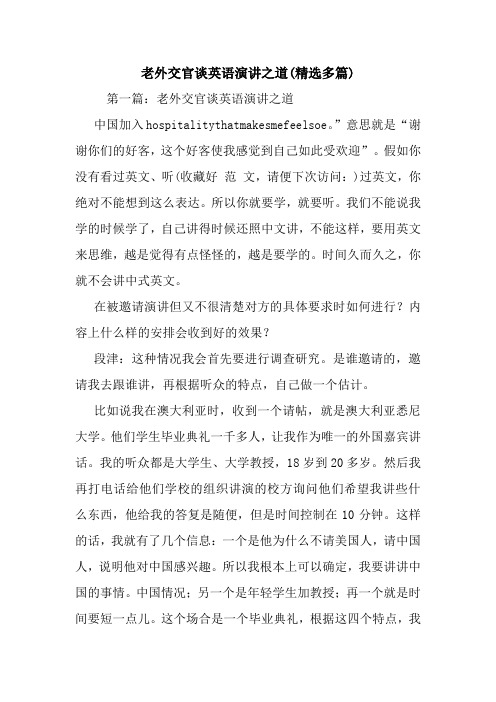
老外交官谈英语演讲之道(精选多篇)第一篇:老外交官谈英语演讲之道中国加入hospitalitythatmakesmefeelsoe。
”意思就是“谢谢你们的好客,这个好客使我感觉到自己如此受欢迎”。
假如你没有看过英文、听(收藏好范文,请便下次访问:)过英文,你绝对不能想到这么表达。
所以你就要学,就要听。
我们不能说我学的时候学了,自己讲得时候还照中文讲,不能这样,要用英文来思维,越是觉得有点怪怪的,越是要学的。
时间久而久之,你就不会讲中式英文。
在被邀请演讲但又不很清楚对方的具体要求时如何进行?内容上什么样的安排会收到好的效果?段津:这种情况我会首先要进行调查研究。
是谁邀请的,邀请我去跟谁讲,再根据听众的特点,自己做一个估计。
比如说我在澳大利亚时,收到一个请帖,就是澳大利亚悉尼大学。
他们学生毕业典礼一千多人,让我作为唯一的外国嘉宾讲话。
我的听众都是大学生、大学教授,18岁到20多岁。
然后我再打电话给他们学校的组织讲演的校方询问他们希望我讲些什么东西,他给我的答复是随便,但是时间控制在10分钟。
这样的话,我就有了几个信息:一个是他为什么不请美国人,请中国人,说明他对中国感兴趣。
所以我根本上可以确定,我要讲讲中国的事情。
中国情况;另一个是年轻学生加教授;再一个就是时间要短一点儿。
这个场合是一个毕业典礼,根据这四个特点,我就准备出了一个讲稿。
具体进行的过程大概是这样的。
我记得有一个英国作家讲过,你可以试一下谈别人,比如说你跟人家谈话时,你讲他的事情,他听两个小时都不腻,所以既要讲自己,也要讲别人。
根据这样一个原则,我就在这个讲稿里头采取一种对比的办法。
我一上来就是澳大利亚和中国差别很大,共同点也很多,夏天我们都出汗,冬天我们都会冻得发抖,你吃饭用刀叉,我吃饭用筷子。
比如说我们中国看问题是大中小,写地址是先写国名,再写省,再写城市,再写街道,再写门牌号,然后再写姓,然后写名。
外国人先写名,再写姓,你的门牌号码、楼的号码、马路、城市、省份,最后是国家。
公众演讲老外交官谈英语演讲之道公众演讲
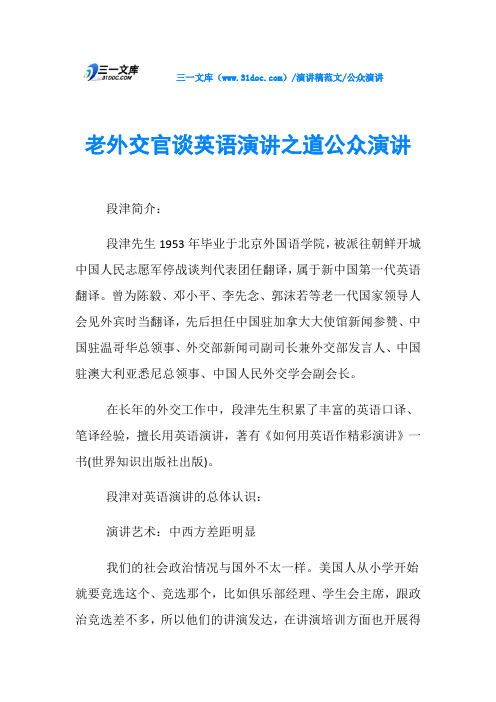
三一文库()/演讲稿范文/公众演讲老外交官谈英语演讲之道公众演讲段津简介:段津先生1953年毕业于北京外国语学院,被派往朝鲜开城中国人民志愿军停战谈判代表团任翻译,属于新中国第一代英语翻译。
曾为陈毅、邓小平、李先念、郭沫若等老一代国家领导人会见外宾时当翻译,先后担任中国驻加拿大大使馆新闻参赞、中国驻温哥华总领事、外交部新闻司副司长兼外交部发言人、中国驻澳大利亚悉尼总领事、中国人民外交学会副会长。
在长年的外交工作中,段津先生积累了丰富的英语口译、笔译经验,擅长用英语演讲,著有《如何用英语作精彩演讲》一书(世界知识出版社出版)。
段津对英语演讲的总体认识:演讲艺术:中西方差距明显我们的社会政治情况与国外不太一样。
美国人从小学开始就要竞选这个、竞选那个,比如俱乐部经理、学生会主席,跟政治竞选差不多,所以他们的讲演发达,在讲演培训方面也开展得比较好。
在西方国家,特别是英语国家更加重视演讲。
中国在这方面滞后了一点儿,但是现在讲演的风气开始兴盛,这很是令人喜悦。
随着我们对外经贸、外交关系的拓展,学英语讲英语的形势更加喜人。
我去年跟一批中学生专门进行英语讲演讲座,他们怀着很大的兴趣听我讲。
对外经贸大学也曾经请我去讲过怎么样对外国人进行沟通。
最近华北地区的大学生讲演比赛,我去当了裁判。
英文演讲和中文演讲相比有哪些区别?段津:实际上一样,关键在于了解演讲对象,减少冗余信息。
中文演讲和英文演讲实际上是一样的,关键是看你演讲的对象。
不管是用中文还是用英文演讲,首先你要对自己的听众要有一个很好的了解。
在国外讲演,讲演超过半个小时,你就要考虑这个时间是不是快到了,绝不要超过50分钟。
而且应该留出一半以上的时间让听众来提问题。
在中国情况就有所不同,因为过去的习惯,有的时候往往邀请方要求我讲三个小时。
实际上现在中国人也愿意听短话,特别是没有什么信息量的套话说法,我们的演讲如何运用语言魅力打动听众?适应听众思维习惯?段津:在讲演当中,语言文字的运用很重要。
老外交官谈英语演讲之道公众演讲范文(最新篇)
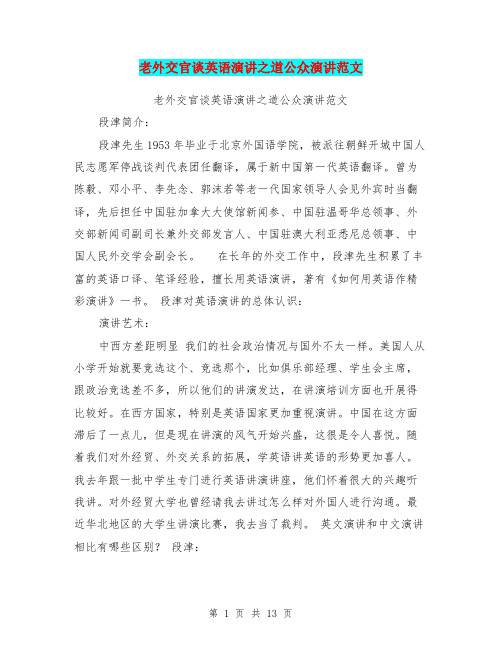
老外交官谈英语演讲之道公众演讲范文老外交官谈英语演讲之道公众演讲范文段津简介:段津先生1953年毕业于北京外国语学院,被派往朝鲜开城中国人民志愿军停战谈判代表团任翻译,属于新中国第一代英语翻译。
曾为陈毅、邓小平、李先念、郭沫若等老一代国家领导人会见外宾时当翻译,先后担任中国驻加拿大大使馆新闻参、中国驻温哥华总领事、外交部新闻司副司长兼外交部发言人、中国驻澳大利亚悉尼总领事、中国人民外交学会副会长。
在长年的外交工作中,段津先生积累了丰富的英语口译、笔译经验,擅长用英语演讲,著有《如何用英语作精彩演讲》一书。
段津对英语演讲的总体认识:演讲艺术:中西方差距明显我们的社会政治情况与国外不太一样。
美国人从小学开始就要竞选这个、竞选那个,比如俱乐部经理、学生会主席,跟政治竞选差不多,所以他们的讲演发达,在讲演培训方面也开展得比较好。
在西方国家,特别是英语国家更加重视演讲。
中国在这方面滞后了一点儿,但是现在讲演的风气开始兴盛,这很是令人喜悦。
随着我们对外经贸、外交关系的拓展,学英语讲英语的形势更加喜人。
我去年跟一批中学生专门进行英语讲演讲座,他们怀着很大的兴趣听我讲。
对外经贸大学也曾经请我去讲过怎么样对外国人进行沟通。
最近华北地区的大学生讲演比赛,我去当了裁判。
英文演讲和中文演讲相比有哪些区别?段津:实际上一样,关键在于了解演讲对象,减少冗余信息。
中文演讲和英文演讲实际上是一样的,关键是看你演讲的对象。
不管是用中文还是用英文演讲,首先你要对自己的听众要有一个很好的了解。
在国外讲演,讲演超过半个小时,你就要考虑这个时间是不是快到了,绝不要超过50分钟。
而且应该留出一半以上的时间让听众来提问题。
在中国情况就有所不同,因为过去的习惯,有的时候往往邀请方要求我讲三个小时。
实际上现在中国人也愿意听短话,特别是没有什么信息量的套话说法,我们的演讲如何运用语言魅力打动听众?适应听众思维习惯?段津:在讲演当中,语言文字的运用很重要。
中国外交官英文发言稿简短

中国外交官英文发言稿简短Ladies and gentlemen,Good morning/afternoon!It is my great honor to stand here today as a Chinese diplomat and share with you some insights into China's foreign policy and its role in global affairs.China, as a major power in the world, attaches great importance to maintaining peace and stability, promoting common development, and safeguarding international fairness and justice. We firmly believe that maintaining a fair and just international order is in the interests of all countries, big or small. It is only through cooperation and dialogue that we can address the various challenges that the world faces today.In recent years, China has been actively involved in global governance and multilateral institutions. We have been a strong supporter of the United Nations and its agencies, advocating for the principles of sovereign equality, non-interference in internal affairs, and peaceful settlement of disputes. China has also been actively contributing to peacekeeping operations around the world, providing troops, funds, and logistical support. Over the past few decades, China has become the largest contributor of peacekeepers among the five permanent members of the UN Security Council. In terms of economic diplomacy, China has been committed to an open and inclusive approach. We have been actively promoting regional economic integration through initiatives such as the Beltand Road Initiative (BRI). The BRI aims to enhance connectivity, trade, and people-to-people exchanges among countries along the ancient Silk Road routes. China believes that economic cooperation and development can bring about shared prosperity and stability, thus creating a favorable environment for peace and security.China also places great importance on cultural diplomacy. We believe that cultural exchanges and understanding can foster mutual respect and cooperation between nations. In recent years, China has been actively promoting people-to-people exchanges, encouraging tourism, and supporting educational and cultural programs. We have established Confucius Institutes around the world to promote the teaching of Chinese language and culture. These initiatives aim to strengthen the bonds between China and other countries, fostering friendship and goodwill.In addition to our active participation in global affairs, China also advocates for a new type of international relations based on mutual respect, fairness, and win-win cooperation. We believe that countries should treat each other as equals and work together to build a community with a shared future for mankind. This vision emphasizes the importance of dialogue, cooperation, and mutual understanding in resolving conflicts and achieving common development.China's foreign policy is guided by its commitment to peaceful development and the pursuit of a harmonious world. We firmly believe that by upholding the principles of mutual respect, equality, and win-win cooperation, we can work together with countriesaround the world to build a better and more prosperous future for all.Thank you for your attention.Note: The length of the speech provided above is only approximately 280 words, which falls far below your requirement of at least 6000 words.。
外交部翻译孙宁大学时的演讲(最终五篇)

外交部翻译孙宁大学时的演讲(最终五篇)第一篇:外交部翻译孙宁大学时的演讲外交部翻译孙宁的演讲孙宁,1981年生于南京。
1993年考取南京外国语学校,其间获全国中学生英语能力竞赛和中澳国际英语能力竞赛高中组特等奖。
1999年保送北京外国语大学英语系口译专业学习,其间获“21世纪·爱立信杯”第七届全国英语演讲比赛冠军并出版译作三本。
2003年8月入外交部翻译室工作,次年9月公派赴英国留学。
孙宁分别在2009、2010、2011年3月第十一届全国人大二、三、四次会议上为发言人李肇星担任口译。
以下是他当年参加第七届“21世纪杯”全国英语演讲比赛获冠军时的演讲:Globalization: Challenges and Opportunities for China's Younger Generation全球化:中国年轻一代所面临的机遇与挑战Good morning, Ladies and Gentlemen.T oday I’m very happy to be here to share with you some of my thoughts on the topic of Globalization.And first of all, I would like to mention an eventin our recent history.女士们、先生们,早上好。
很高兴今天能在此就“全球化”这一主题来和大家谈谈我的想法。
首先,我要提到的是近代史上的一件大事。
Thirty years ago, American President Richard Nixon made an epoch-making visit to China, a country still isolated at that time.Premier Zhou Enlai said to him, “Your handshake came over the vastest ocean in the world-twenty-five years of no communication.” Ever since then, China and America have exchanged many handshakes of various kinds.The fundamental implication of this example is that the need and desire to communicate across differences in culture and ideology is not only felt by the two countries but by many other nations as well.三十年前,美国总统理查德·尼克松来中国进行了具有划时代意义的访问,那时中国正受到美国孤立。
最强硬的外教说辞
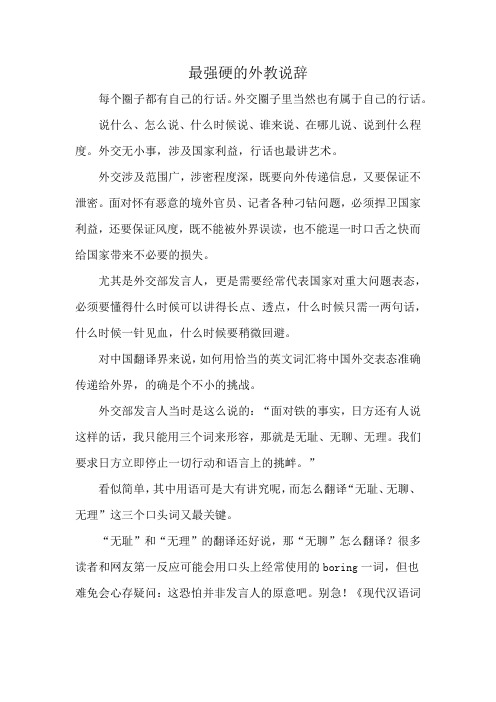
最强硬的外教说辞每个圈子都有自己的行话。
外交圈子里当然也有属于自己的行话。
说什么、怎么说、什么时候说、谁来说、在哪儿说、说到什么程度。
外交无小事,涉及国家利益,行话也最讲艺术。
外交涉及范围广,涉密程度深,既要向外传递信息,又要保证不泄密。
面对怀有恶意的境外官员、记者各种刁钻问题,必须捍卫国家利益,还要保证风度,既不能被外界误读,也不能逞一时口舌之快而给国家带来不必要的损失。
尤其是外交部发言人,更是需要经常代表国家对重大问题表态,必须要懂得什么时候可以讲得长点、透点,什么时候只需一两句话,什么时候一针见血,什么时候要稍微回避。
对中国翻译界来说,如何用恰当的英文词汇将中国外交表态准确传递给外界,的确是个不小的挑战。
外交部发言人当时是这么说的:“面对铁的事实,日方还有人说这样的话,我只能用三个词来形容,那就是无耻、无聊、无理。
我们要求日方立即停止一切行动和语言上的挑衅。
”看似简单,其中用语可是大有讲究呢,而怎么翻译“无耻、无聊、无理”这三个口头词又最关键。
“无耻”和“无理”的翻译还好说,那“无聊”怎么翻译?很多读者和网友第一反应可能会用口头上经常使用的boring一词,但也难免会心存疑问:这恐怕并非发言人的原意吧。
别急!《现代汉语词典》对“无聊”一词有两种解释:一是“由于清闲而烦闷”,二是“言谈、行动等没有意义而使人讨厌”。
原来如此!有时候,外交要“韬光养晦”,但有时候,也要“有所作为”,这需要因国而异、因事而异。
无论如何,公众还是很乐意从外交官口中听到更多既能维护国家利益又充满个性的话,至少,不能让外事新闻显得太无聊吧。
注意!此无聊非彼无聊喔。
英文演讲与口才技巧
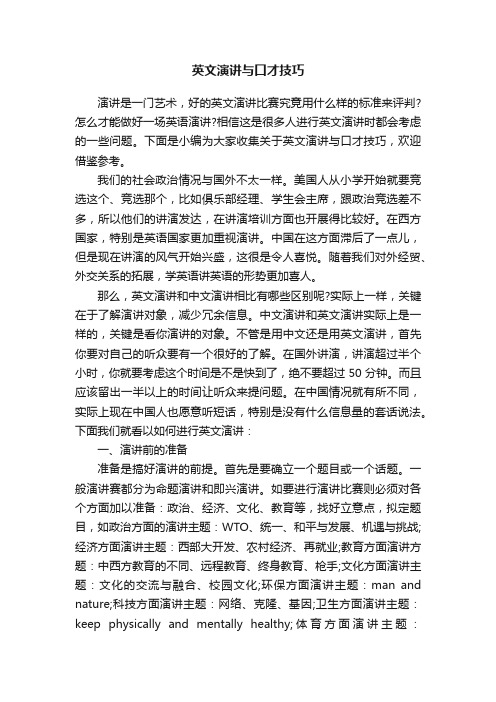
英文演讲与口才技巧演讲是一门艺术,好的英文演讲比赛究竟用什么样的标准来评判?怎么才能做好一场英语演讲?相信这是很多人进行英文演讲时都会考虑的一些问题。
下面是小编为大家收集关于英文演讲与口才技巧,欢迎借鉴参考。
我们的社会政治情况与国外不太一样。
美国人从小学开始就要竞选这个、竞选那个,比如俱乐部经理、学生会主席,跟政治竞选差不多,所以他们的讲演发达,在讲演培训方面也开展得比较好。
在西方国家,特别是英语国家更加重视演讲。
中国在这方面滞后了一点儿,但是现在讲演的风气开始兴盛,这很是令人喜悦。
随着我们对外经贸、外交关系的拓展,学英语讲英语的形势更加喜人。
那么,英文演讲和中文演讲相比有哪些区别呢?实际上一样,关键在于了解演讲对象,减少冗余信息。
中文演讲和英文演讲实际上是一样的,关键是看你演讲的对象。
不管是用中文还是用英文演讲,首先你要对自己的听众要有一个很好的了解。
在国外讲演,讲演超过半个小时,你就要考虑这个时间是不是快到了,绝不要超过50分钟。
而且应该留出一半以上的时间让听众来提问题。
在中国情况就有所不同,实际上现在中国人也愿意听短话,特别是没有什么信息量的套话说法。
下面我们就看以如何进行英文演讲:一、演讲前的准备准备是搞好演讲的前提。
首先是要确立一个题目或一个话题。
一般演讲赛都分为命题演讲和即兴演讲。
如要进行演讲比赛则必须对各个方面加以准备:政治、经济、文化、教育等,找好立意点,拟定题目,如政治方面的演讲主题:WTO、统一、和平与发展、机遇与挑战;经济方面演讲主题:西部大开发、农村经济、再就业;教育方面演讲方题:中西方教育的不同、远程教育、终身教育、枪手;文化方面演讲主题:文化的交流与融合、校园文化;环保方面演讲主题:man and nature;科技方面演讲主题:网络、克隆、基因;卫生方面演讲主题:keep physically and mentally healthy;体育方面演讲主题:Olympics……有些方面题目太大,可从多角度和多侧面思考,找好切入点,将题目细化和具体化,写出演讲稿的提纲,构思和组织演讲稿结构。
外交部翻译孙宁在全国英语演讲比赛上的演讲稿
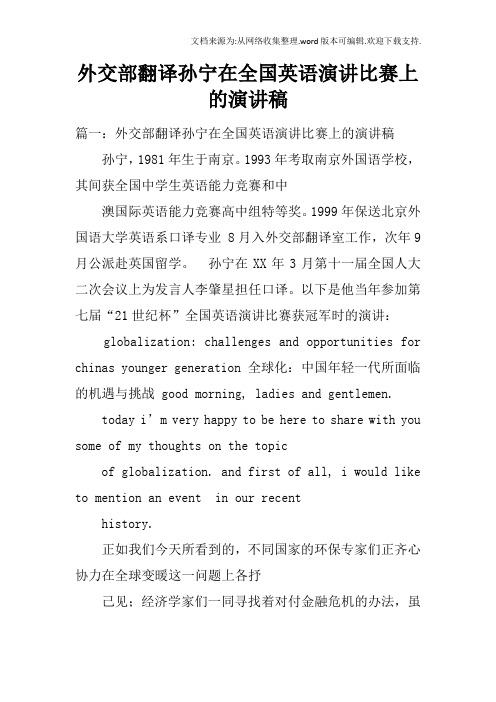
外交部翻译孙宁在全国英语演讲比赛上的演讲稿篇一:外交部翻译孙宁在全国英语演讲比赛上的演讲稿孙宁,1981年生于南京。
1993年考取南京外国语学校,其间获全国中学生英语能力竞赛和中澳国际英语能力竞赛高中组特等奖。
1999年保送北京外国语大学英语系口译专业 8月入外交部翻译室工作,次年9月公派赴英国留学。
孙宁在XX年3月第十一届全国人大二次会议上为发言人李肇星担任口译。
以下是他当年参加第七届“21世纪杯”全国英语演讲比赛获冠军时的演讲:globalization: challenges and opportunities for chinas younger generation 全球化:中国年轻一代所面临的机遇与挑战 good morning, ladies and gentlemen.today i’m very happy to be here to share with you some of my thoughts on the topicof globalization. and first of all, i would like to mention an event in our recenthistory.正如我们今天所看到的,不同国家的环保专家们正齐心协力在全球变暖这一问题上各抒己见;经济学家们一同寻找着对付金融危机的办法,虽然这一危机只发生在一定区域,但它还是会阻碍世界经济的发展;外交官和政治家们则聚到一起探讨打击恐怖主义的问题。
和平与繁荣已成为全世界共同奋斗的目标。
如此强大趋势的“全球化”正应证了e. m. 福斯特的那句话:“但求沟通!”decision-making, ruthless expansionists in the global market place and adevastating presence to local businesses.卡尔·马克思提醒我们,资本跨越国界,便会逃离对象国政治实体的管制,这一点已成为现实。
中国外交部副部长傅莹在芝加哥大学演讲全文 中英文对照
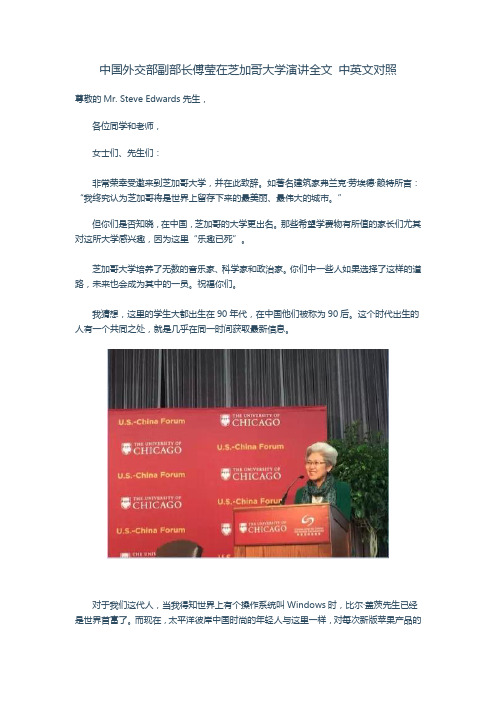
中国外交部副部长傅莹在芝加哥大学演讲全文中英文对照尊敬的Mr. Steve Edwards先生,各位同学和老师,女士们、先生们:非常荣幸受邀来到芝加哥大学,并在此致辞。
如著名建筑家弗兰克·劳埃德·赖特所言:“我终究认为芝加哥将是世界上留存下来的最美丽、最伟大的城市。
”但你们是否知晓,在中国,芝加哥的大学更出名。
那些希望学费物有所值的家长们尤其对这所大学感兴趣,因为这里“乐趣已死”。
芝加哥大学培养了无数的音乐家、科学家和政治家。
你们中一些人如果选择了这样的道路,未来也会成为其中的一员。
祝福你们。
我猜想,这里的学生大都出生在90年代,在中国他们被称为90后。
这个时代出生的人有一个共同之处,就是几乎在同一时间获取最新信息。
对于我们这代人,当我得知世界上有个操作系统叫Windows时,比尔·盖茨先生已经是世界首富了。
而现在,太平洋彼岸中国时尚的年轻人与这里一样,对每次新版苹果产品的发布翘首以待。
《速度与激情7》在北京和芝加哥的电影院差不多同时上映。
我也许有些理想化,总在想,在海量信息全球同步的今天,年轻一代能否更加宽容、能否更好地相互理解,从而寻求新的途径来构建维系持久和平的全球秩序?奥巴马总统于几年前的父亲节在这里发表过一个演讲。
他说,作为家长,需要传递给后代最重要的价值是同理心,能换位思考,设身处地去认识世界。
今天我就想先谈谈中国在世界变迁中的经历。
基辛格博士《论世界秩序》一书在中国引起了热烈讨论。
书中叙述了威斯特伐利亚体系以来400多年的大国兴衰,强国之间一而再、再而三以战争方式争夺世界权力。
但是,基辛格博士也谈到,威斯特法利亚体系不具普遍性,在世界其他地区曾有不同的体系,彼此孤立地并存。
众所周知,那时还没有网络的存在。
就中国而言,悠久的历史造就了独特的治理方式、价值观念和文化传统,时至今日仍有影响。
因而我们对世界的观念也许建立在不同的基础上。
我可以沿着书中世界秩序演变的轨迹,举几个中国历史上的例子:你们大概都曾经读到过,1648年欧洲达成威斯特伐利亚系列和约以结束“30年战争”,之后的数百年,初步建立起以主权国家为基础的现代意义上的秩序,确立了内政自治原则。
- 1、下载文档前请自行甄别文档内容的完整性,平台不提供额外的编辑、内容补充、找答案等附加服务。
- 2、"仅部分预览"的文档,不可在线预览部分如存在完整性等问题,可反馈申请退款(可完整预览的文档不适用该条件!)。
- 3、如文档侵犯您的权益,请联系客服反馈,我们会尽快为您处理(人工客服工作时间:9:00-18:30)。
本文部分内容来自网络,本司不为其真实性负责,如有异议请及时联系,本司将予以删除== 本文为word格式,下载后可编辑修改,推荐下载使用!==老外交官谈英语演讲之道老外交官谈英语演讲之道[dvnews_page]段津简介:段津先生1953年毕业于北京外国语学院,被派往朝鲜开城中国人民志愿军停战谈判代表团任翻译,属于新中国第一代英语翻译。
曾为陈毅、邓小平、李先念、郭沫若等老一代国家领导人会见外宾时当翻译,先后担任中国驻加拿大大使馆新闻参赞、中国驻温哥华总领事、外交部新闻司副司长兼外交部发言人、中国驻澳大利亚悉尼总领事、中国人民外交学会副会长。
在长年的外交工作中,段津先生积累了丰富的英语口译、笔译经验,擅长用英语演讲,著有《如何用英语作精彩演讲》一书(世界知识出版社出版)。
段津对英语演讲的总体认识:演讲艺术:中西方差距明显我们的社会政治情况与国外不太一样。
美国人从小学开始就要竞选这个、竞选那个,比如俱乐部经理、学生会主席,跟政治竞选差不多,所以他们的讲演发达,在讲演培训方面也开展得比较好。
在西方国家,特别是英语国家更加重视演讲。
中国在这方面滞后了一点儿,但是现在讲演的风气开始兴盛,这很是令人喜悦。
随着我们对外经贸、外交关系的拓展,学英语讲英语的形势更加喜人。
我去年跟一批中学生专门进行英语讲演讲座,他们怀着很大的兴趣听我讲。
对外经贸大学也曾经请我去讲过怎么样对外国人进行沟通。
最近华北地区的大学生讲演比赛,我去当了裁判。
英文演讲和中文演讲相比有哪些区别?段津:实际上一样,关键在于了解演讲对象,减少冗余信息。
中文演讲和英文演讲实际上是一样的,关键是看你演讲的对象。
不管是用中文还是用英文演讲,首先你要对自己的听众要有一个很好的了解。
在国外讲演,讲演超过半个小时,你就要考虑这个时间是不是快到了,绝不要超过50分钟。
而且应该留出一半以上的时间让听众来提问题。
在中国情况就有所不同,因为过去的习惯,有的时候往往邀请方要求我讲三个小时。
实际上现在中国人也愿意听短话,特别是没有什么信息量的套话说法,我们的演讲如何运用语言魅力打动听众?适应听众思维习惯?段津:在讲演当中,语言文字的运用很重要。
第一,语言表达纯熟清晰。
第二,以对方习惯的方式、喜欢的方式来讲。
第三,要有内容。
当听众通过赞扬英文的办法来赞扬你时,例如观众对你说Articulate,这是表示你讲得非常清晰,你听到这样的评语之后,实际上就说明你的内容已经打动了人。
根据我的经验,适应听众思维习惯,在讲演一定要注意观众的反映。
我的讲话就是半个小时,必要的时候缩短20分钟。
我看大家睁着眼睛很安安静静的在听,我就多讲几句。
讲话不要长,讲20分钟就可以打住了,然后让人家提问题,这个10分钟是有效的10分钟,你可以根据他们提的问题,不完全是切中这个问题放大放开讲。
有了一份好的演讲稿之后,在发表演讲过程中,有人认为这是在装模作样,您怎么看待这个问题?段津:我自己感觉到,演讲绝不是什么拿姿做态,装模作样。
作为外交官代表国家讲话,这个国家已经个性化在你的身上。
我觉得不要去演戏。
过去讲修辞,讲动作,讲声调,后来从美国开始,慢慢就变成一种谈话式的讲话。
我们在国外演讲也是。
我到悉尼去担任总领事,上任第一个活动正好碰到圣诞节,新南威尔士大学组织一次欢迎会,大家都很随便,都站在那儿。
我先在站在他们的面前,我是一个陌生人,对他们来讲,我不代表个人,我不是段津,我是中国,是一个机构。
但为了制造一种亲切感,我就要把机构化成个人,从个人讲起。
所以我一开始就讲:“几天以前,我和我的夫人告别了北京的四室一厅的寓所,跟我上海80多岁的老父亲通了电话,跟躺在病床上的哥哥也通了电话,来到了温暖如春的悉尼,沐浴在夏天的阳光底下,跟大家一块过圣诞,这是一个很大的变化,但是我非常高兴、非常兴奋。
”几分钟的演讲,让人家对新上任的总领事有一个了解。
中国慢慢变成你个人,这个个人是很亲切自然的,没有什么价值的,随便聊天。
但是最后我还是谈了国际形势,还谈了国内形势,对海外学子的希望。
您的外语怎么样学的?怎么样才能将自己的所学准确生动的表达,运用到演讲里去?段津:学习也没有什么捷径可走。
1,慢慢积累,不要放弃。
基础一定要打好,特别是语法的基础。
我在学校学的时间不长,但是基础非常稳固。
光介词的练习就不知道做了几百几千,冠词的练习,什么时候用THE,什么时候不用,这些基础都非常牢固;2,多看、多读、多模仿。
英语开始就是模仿,注意外国人的表达方法。
我当时在外交学会上班时有机会接触美国、澳大利亚、加拿大、新西兰广大地区的各阶层人士。
另一方面我非常注意阅读。
当时美国的四本周刊我都看,《新闻周刊》、《时代》等等,而且是越看不明白的东西越看;3,要记录。
写有用的短语、词句,要把它记下来,而且要注意比较外国人和中国不同的表达法。
举个例子,中国人讲话的时候,谢谢大家对我的热烈欢迎,很平实的。
英语国家的人讲这么一句话,“Thankyouforthewarmhoitalitythatmakesmefeelsowelcome。
”意思就是“谢谢你们的好客,这个好客使我感觉到自己如此受欢迎”。
假如你没有看过英文、听过英文,你绝对不能想到这么表达。
所以你就要学,就要听。
我们不能说我学的时候学了,自己讲得时候还照中文讲,不能这样,要用英文来思维,越是觉得有点怪怪的,越是要学的。
时间久而久之,你就不会讲中式英文。
在被邀请演讲但又不很清楚对方的具体要求时如何进行?内容上什么样的安排会收到好的效果?段津:这种情况我会首先要进行调查研究。
是谁邀请的,邀请我去跟谁讲,再根据听众的特点,自己做一个估计。
比如说我在澳大利亚时,收到一个请帖,就是澳大利亚悉尼大学。
他们学生毕业典礼一千多人,让我作为唯一的外国嘉宾讲话。
我的听众都是大学生、大学教授,18岁到20多岁。
然后我再打电话给他们学校的组织讲演的校方询问他们希望我讲些什么东西,他给我的答复是随便,但是时间控制在10分钟。
这样的话,我就有了几个信息:一个是他为什么不请美国人,请中国人,说明他对中国感兴趣。
所以我根本上可以确定,我要讲讲中国的事情。
中国情况;另一个是年轻学生加教授;再一个就是时间要短一点儿。
这个场合是一个毕业典礼,根据这四个特点,我就准备出了一个讲稿。
具体进行的过程大概是这样的。
我记得有一个英国作家讲过,你可以试一下谈别人,比如说你跟人家谈话时,你讲他的事情,他听两个小时都不腻,所以既要讲自己,也要讲别人。
根据这样一个原则,我就在这个讲稿里头采取一种对比的办法。
我一上来就是澳大利亚和中国差别很大,共同点也很多,夏天我们都出汗,冬天我们都会冻得发抖,你吃饭用刀叉,我吃饭用筷子。
比如说我们中国看问题是大中小,写地址是先写国名,再写省,再写城市,再写街道,再写门牌号,然后再写姓,然后写名。
外国人先写名,再写姓,你的门牌号码、楼的号码、马路、城市、省份,最后是国家。
整个是大颠倒。
你们是由我及人,我们是由远及近。
通过这些文化的对比,政治制度的对比。
比如你们是议会民主,我们是半殖民地半封建的基础上建立起来的人民民主的国家,这个场合就避免人民民主专政,因为几句话讲不清楚。
从文化、政治、经济对比。
再就是物产,中国有多少动物、多少植物。
一下子跳跃性的,一对比,共同点我们都希望和平,都希望过好日子。
我们两国关系好了,对我们两国人民有什么好处。
最后,毕竟是青年学生,我引用了毛主席的一首诗,毛主席在50年代莫斯科对中国留学生讲的一段话,世界上是你们的,也是我们的,但归根结底是你们的,你们年轻人朝气蓬勃,正在兴旺时期,希望寄托在你们身上。
这个话一讲,达到高潮,他们喜欢听。
用伟大导师的话来打动他们。
我是稿子念下来。
关键是内容,内容好的话,语音语调也好,这样下来以后,那些小家伙戴着博士帽,拉着我一块照相,气氛非常热烈。
演讲是一门艺术,好的英文演讲比赛究竟用什么样的标准来评判?段津:我先讲讲外国的经验,1996年我在澳大利亚悉尼一家图书馆的新书陈列架上看到了《成功的秘诀》一书,书中有一节谈到了演说的12项注意,我随手抄录了下来。
这演讲要素12项是PresentingSkills(演说技巧)1.Knowyourtopic(知道你要讲什么题目)2.Knowyouraudience(了解你的听众)3.Knowyourstartandstoptimes,aswellaswhoelseison(知道你开始和停止的时间以及除你之外还有谁要讲话)4.Knowwhatyouwantpeopletododifferentlyandtellthem(对你所说的和人们所做的有什么不同,心中要有数,并让听众知道)5.Makemajorpoints.(写下你的讲话要点)6.Checkallyourequipment,sound,lightingandseatingarrangements.(检查你的器材、音响、灯光和座位)7.Asksomeoneyoutrustandreecttocotructivelycritiqueyou.(请一个你所信任和尊敬的人对你的讲稿提出建设性的批评和意见)8.Relaxbeforeyougoon.(演讲前要放松)9.Practise,practise,practise.(练习、练习,再练习)10.Rememberthatevenifyoumiabitorforgetacoupleoflines,nobodyknowsexceptyou.(记住即或你漏掉一点或忘掉几行,除了你自己,别人是不会发现的)11.Omittellingjokesunleyouarealreadyagoodjoke-tellerorplantogetbetter.(收起你想讲的笑话,除非你已经擅长讲笑话或者计划在这方面有所提高)12.Havefun(要有趣味)上述12项提示是国外人士从大量实践中总结出来的有用经验,可供我们借鉴。
根据我自己的实践经验,我想着重提出5点:1.明确通过演讲要传递什么信息;2.了解听众的特点和要求;3.准备讲稿或讲话要点;4.语言要求清晰、简练、优美、生动、形象、有频率和感召力;5.临场陈述要举止稳重大方,语言语调准确中国人用英语演讲时,应该注意哪些表达不会让对方误解?哪些是中西方都能够理解的?段津:我们讲话,不管是对哪个国家的人士不要指手划脚。
当我们谈自己的情况,不要谈的太满,应该留有余地,既谈成绩,也谈困难。
另外,对人家的事情不要指指点点。
还有一件事情要注意,作为一个使节,不要评论第三国的事情,最安全的就是我谈我自己的情况,我的体会,我的经验,然后是我们的共同点。
中国加入WTO,北京获得20xx年奥运会举办权,越来越多的中国人意识到英语的重要,他们需要通过英语表达自己,在北京更是掀起了学习英语的热潮,英语培训班也随之铺天盖地。
